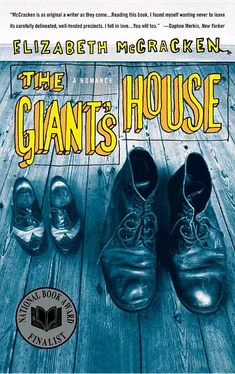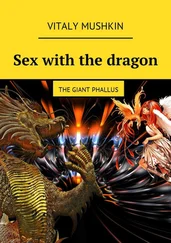He tried to recruit students from the tourists who visited James, but it was like the end of a summer romance. Write to me, remember me, won’t you? They never did. They remembered only the prairie of mattress, the chair as big as a haystack, sent their friends, and came back themselves.
“Charge money,” the tourists said. “Charge money,” said Astoria, and Oscar, and even Leila, the Smallest Woman in the World, who sent a package from her winter home in Florida. Inside was the promised record: Julia Lee and her Boyfriends singing “King-Sized Papa.” I’d almost thought she’d been making it up, but we listened: I got a man that’s more than eight feet tall.…
“You make people pay to look at you in New York,” Leila wrote in her tiny messy handwriting. “No problem to make them pay to look at you at home. Better in fact.”
But James couldn’t make himself do it, and I was inclined to agree. Somehow charging money for posing for photographs was different, a clear transaction. Asking admission to his house was worse. There was a line that you crossed when you decided that you existed for other people. There were a million ways to cross it. You married and changed your name to Mrs. Roger Husband; you went to medical school only because your parents wanted you to. It was a selfishness, to deny yourself like that. I knew. You took care of other people all your days, you gave up your own plans. In these ways you abdicated responsibility: you became an exhibition in someone else’s life. Oh, I knew it, I did, and perhaps I didn’t like people — haven’t I said that enough, that I didn’t like people? — but I liked myself a good deal less, I could not bear to be alone, I needed my library patrons, I needed Oscar and Caroline and cranky little Alice and, of course, I needed James above everybody else. If I’d had the choice, if people were offering, I would have charged admission to myself. Maybe it would have made more people interested.
But James was better than me. In every way he was better, and I didn’t want him to succumb to needing either strangers or their lousy spare change.
“Alice,” James said. “Come here.” Now that Alice walked, she sometimes came toddling down the path to drag Kazoo to the front house for a visit. That made the cat worth something, James thought; any creature who brought Alice around was worth something. He asked Caroline and Oscar to bring some of her toys and books over to the cottage.
“Yah?” she said. She came up to the edge of the bed.
“How are you, Alice?”
“Good. You sick?”
“No. Will you read me a story?”
Alice went to get a book. She couldn’t read yet, of course, but one didn’t dare tell her that. She climbed on the bed from the seat of the step-chair Caroline had brought over for this purpose.
“There were dogs,” she said. James closed his eyes. “And they got in a car and they drove away, and then they crashed and they crashed and they crashed and they crashed.” She stopped for a minute, fingering the page.
“Then what?” James asked.
“And they crashed and they crashed and then they got up and they turned around and they crashed and they crashed and they crashed.”
“A sad story,” said James.
“No-oo-o,” said Alice, looking at the book. Then she let it slide off her lap onto the floor, where it flopped spine up. I went to retrieve and close it.
“Peggy doesn’t like it when you treat books that way,” James said. But Alice didn’t look at me. She crawled up to James’s face and began to pat it, as if it were one of those crashing dogs.
“Good girl,” Alice said, patting James.
“Me or you?” James asked. “I’m not a girl, and I’m not sure how good I am. Maybe you mean Kazoo.” The cat was asleep on the far corner of the bed.
“She’s a girl,” I said. “But she’s definitely not good.”
“Good girl,” said Alice. She had her palm open, dabbing at James’s face. “Good, good girl.”
Now I can look back on those days six months after New York and see he was dying. Although strictly speaking he wasn’t — there was nothing for him to be dying of yet. Height wouldn’t kill him, after all; it was just that his height made him susceptible to other things. But he was weakening, worn out. I sat by his bed some evenings while he napped. The circus invited him to go to Boston for the 1959 spring tour, and he wanted to — now he was interested in all cities and their mysteries. I stuck signs on the cottage door that told the tourists to go away, but they still pressed their faces to the window, still knocked on the glass. If James was asleep, I didn’t even turn my head to look at them. They thought I was stubborn or deaf. That was fine.
When he was awake, he’d call out in his thick husky voice, “Come in.” They would, but he wasn’t so interesting when he was in bed. Impressive still, but even tourists turned uncomfortable in the company of a man under a blanket, a sick man. The room smelled like an old quilt, a mixture of history and mildew and a huge, on-the-blink body. They didn’t know what was wrong with him. They thought he was dying of too much of himself. “Some place,” they’d say, looking around, and then they’d hustle their children out. Only when he sat in the armchair — shabby now, after several years of teenage use, even looking a little small for him — would they stay and talk.
One night I sat there reading. At least, I had a book open on my lap. Kazoo, growing out of kittenhood, jumped on top of the book, and then up to the bed. She dug her claws into my arm to push off.
“Bad cat,” I said to her.
James opened his eyes. “Good cat,” he said absentmindedly. “Are you torturing Peggy? Good cat.”
“Rotten animal, through and through.” I put my hand out, hoping just once she’d walk under it to be scratched — she did it for everyone else — but she rubbed up against James’s shoulder instead.
He made a clicking noise with his tongue, and the cat sniffed his nose, then curled up beneath his chin. “Aunt Caroline says I should be careful, I’ll roll over in my sleep and kill her.”
“Doubtful,” I said.
“I don’t roll over. I’m too heavy. The cat’s safe anyhow. She likes to sleep on my pillow.”
“She knows that’s where you live.”
“What do you mean?”
“In your head,” I told him. “You live in your head. Everybody lives somewhere in their body. Hands, heart, private parts. Some people live anyplace but their head. Remember Patty Flood? She, I believe, lived in Jesus.”
“Where do you live?”
“Oh,” I said. I didn’t answer.
“You have a habit,” he told me, “of asking questions of others that make yourself blush.”
“That much is true.”
“Where do you live, Peggy?”
“Me?” I closed my book and looked at him. “I live in a whole other room from my body, I live down the block.”
“Not really,” he said.
I put down the book and climbed up to sit on the edge of the bed. The cat jumped off. She didn’t even pretend to like me. “My body is a dull place. Who’d choose to live here?”
“I might,” he said. “If I could move. But here I am.” He pulled one arm free from the covers; his pajama top was striped a cool blue. “At least the view was good. And you. I think I know where you live.”
“Where?”
He slapped his right leg, three times. “Here. Me. Vicariously, I mean. Bad choice. You should have picked someone who has more fun.”
“You have fun,” I said. A stupid comment.
But he said, “Yes, sometimes.” He put his hand on mine. I held it a second.
I didn’t know what would happen next.
“You should go back to sleep,” I said.
Читать дальше












